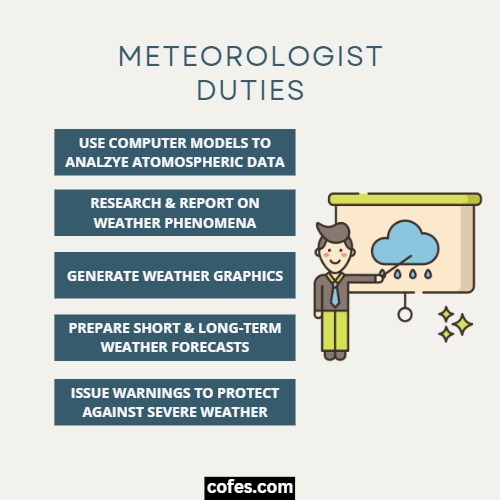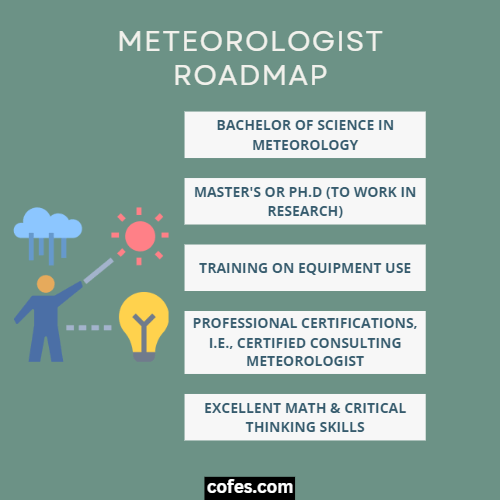At this point, meteorologists tend to focus on a single aspect of the fast-evolving science.
Nevertheless, the boundaries between specializations are blurry, and meteorologists typically work across many disciplines.
Operational meteorologists, the formal word for weather forecasters, make up most of the field’s experts.
They interpret real-time weather data from many sources worldwide, such as weather satellites, radar, and other distant sensors, such as wind speed and direction.
As a result of this information, forecasters may produce short- and long-term outlooks for specific geographic areas.
Meteorologist Job Information
| Official Job Title | Meteorologist |
| Average Salary | $105,746 |
| Stress Level | Low |
| Work/Life | Average |
| Job Satisfaction | High |
| Career Advancement | High |
Meteorologist Job Description
What is a Meteorologist?
Meteorologists are experts in the science of weather and climate.
Meteorologists in research are those who research meteorological phenomena, whereas operational meteorologists are those who use mathematical models and information to create daily weather forecasts.

What Does a Meteorologist Do Daily?
- Collect meteorological data in one nation, while technicians in another country do the majority of the work.
- Prepare daily weather forecasts by analyzing data and the output of numerical weather prediction models.
- Provide private and governmental users with weather advice and assistance.
- Assist researchers in integrating science and technology into forecasting, particularly for indices and model outputs, to benefit weather-dependent businesses like agriculture, forestry, aviation, marine shipping, and fisheries.
Responsibilities, Duties & Roles Of A Meteorologist
When it comes to weather forecasting, a meteorologist uses computer graphic equipment to produce weather reports.
They analyze weather reports for distribution to users, as well as for televised weather broadcasts.
They broadcast weather forecasts on television or radio.
They issue hurricane advisories when necessary.
Meteorologists deal with weather data analysis, interpretation, and preparation for the public.
Meteorologist Salary
Average Salary
A Meteorologist can expect to make anywhere between $105,746 a year on average.
Your payment will vary based on where you work, your experience level, and your skills.
Starting Salary
An entry-level meteorologist can expect to make anywhere between $52,500 a year.
Your payment will vary based on where you work, your experience level, and your skills.
Senior Salary
A Meteorologist can expect to make anywhere between $124,824 a year in a senior position.
Your payment will vary based on where you work, your experience level, and your skills.
For more information on meteorologist salary, click here
How To Become A Meteorologist?
The Entry Level: Certification, Training & Degree
Meteorologists must hold a bachelor’s degree, although companies prefer those with Master’s degrees if they desire to go into business.
Engineering and atmospheric science bachelor’s degrees are joint, as are meteorology courses.
Work with the federal government necessitates extensive weather analysis, dynamic meteorology, and forecasting training.
Other Skill Sets, Requirements & Qualifications
A potential meteorologist must have a strong interest in the natural world.
When it comes to understanding meteorological conditions, they’ll need strong analytical abilities and reliable resources to back up their conclusions.
Patience is a virtue when it comes to long research sessions and intervals of inactivity.
How Long Does it Take to Become a Meteorologist?
For entry-level meteorology jobs, you’ll need a bachelor’s degree.
Many meteorologists, on the other hand, go on to get Master’s or even Ph.D. degrees.
A master’s degree requires an extra two years of study after an undergraduate degree for most subjects.
Is it Hard To Become A Meteorologist?
It is not an easy profession to hold.
If you want to work as a Meteorologist, you’ll need to be an outstanding communicator.
Because you will be using math, science, and computers regularly, you should be proficient in all three.
You’ll have to learn how to cooperate with others to be successful.
Meteorologist Career Paths
The Meteorologist Roadmap
Decide on your future career.
Meteorologists are the term used to describe weather forecasters on television.
Aspiring weather anchors should have a bachelor’s degree in journalism or a closely related discipline such as communications.

Go to college and major in meteorology or a related field of the natural sciences.
Meteorology necessitates strong computer skills as well as a solid foundation in physics, chemistry, and mathematics.
To work as a meteorologist, you must have a Bachelor of Science in meteorology or atmospheric sciences.
After earning a bachelor’s degree, many people go on to make a master’s.
Specializations in meteorology include weather forecasting and broadcasting, atmospheric science, and climatology.
Improve your technological knowledge.
To become a meteorologist, you’ll need a solid grasp of current technology, as well as sophisticated computer abilities.
Throughout your work in this field, you may come across data and databases, scientific gadgets, meteorological measurement equipment and software, and even broadcasting equipment.
To be successful in meteorology, you must be proficient in cutting-edge technologies.
Build knowledge.
It doesn’t matter what career path you choose; an internship is a must.
Universities’ career services departments can help you find an internship shadowing a meteorologist.
Students who pursue a career in science while still in school will have several possibilities to work as interns for various businesses.
Update your employment history and apply.
To start your career as a meteorologist, you must first complete the steps outlined above.
To begin, make sure your resume is current with your most recent training, education, and work history.
You can use terms from the job description to represent your work style in your cover letter.
Projections For Growth In Meteorologist Jobs
A 4% increase in atmospheric scientists, including meteorologists, is expected through 2031.
Over the next ten years, the number of new positions available for atmospheric scientists, including meteorologists, will raise by 300 jobs.
There will be numerous vacancies due to replacing workers who change professions or leave the workforce for various reasons.
Click here for more details.
Is Meteorologist A Good Career?
Meteorologist is a good profession.
They analyze weather patterns every day to forecast what will most likely happen soon.
Weather patterns and tornadoes are two topics that must fascinate you.
You will learn to understand how storms or tornadoes form and track them and be ready to dig into the statistics and research.
Overall, a passion for weather and a desire to learn more about how mother nature operates is required.
Working Conditions
Can A Meteorologist Work Remotely From Home?
You can work from home as a meteorologist.
How Many Hours Does A Meteorologist Work?
Meteorologists work more than 40 hours a week in some cases.
Other atmospheric scientists work a regular work week; however, specific projects need them to work nights and weekends.
Can A Meteorologist Work Part-Time?
Weather data must be recorded and analyzed at regular intervals by meteorologists.
Meteorologists often work on weekends and holidays to make sure weather trends are maintained.
So, meteorologists work full time
What Are The Average Vacation Days Of Meteorologists?
In the busiest year, meteorologists take 10-14 days off on average.
Alternative Careers & Similar Jobs to a Meteorologist
- Forensic Science Technician
- Natural Sciences Manager
- Neuroscientist
- Dietitian
- Hydrologist
- Archaeologist
- Food Scientist
- Marine Biologist
- Physicist
- Research Assistant
Meteorologist Resume Tips
To write your meteorological resume, follow these steps:
#1 Identify yourself by providing your name and a way to reach you.
Adding your name and contact information to a resume is generally the first step in the writing process.
Why?
Because your contact information is prominently displayed at the top of your resume, instantly connecting your name to the position you’re seeking.
#2 It is necessary to write professional summaries.
Professional summaries might be a single paragraph or a list of bullet points outlining your experience and educational history.
Adjectives used to describe the individual providing the summary, such as “dedicated” or “experienced,” occasionally introduce the summary.
Employers may see this as a sign of your excitement and confidence in the field.
#3 Give an overview of your professional background.
The job experience section of a meteorologist’s resume is crucial since it allows you to describe your degree of knowledge and highlight your unique skills.
It includes the title of the position you had and your prior employer’s name, and some of your responsibilities during that period.
#4 Include a list of your qualifications.
It’s also a good idea to use caution while composing a meteorologist’s resume’s abilities section.
Working as a meteorologist typically requires a combination of industry-specific technical ability and transferrable soft skills applicable to various occupations.
#5 Include any qualifications you have earned.
Even though certification is optional for meteorologists, many of them pursue it nonetheless.
As a result, they can demonstrate their expertise while also earning more qualifications.
One of the most well-known qualifications for meteorologists is that of Certified Consulting Meteorologist (CCM), while the other is that of Certified Broadcast Meteorologist
#6 It would help if you talked about your education.
Employers usually require a bachelor’s degree in meteorology.
Therefore, including your educational background on your CV is critical.
Candidates can acquire a Bachelor of Science in a closely related field like atmospheric science and a Bachelor of Science in meteorology, which is likely to be the most popular degree amongst aspiring meteorologists.
Meteorologist Interview Questions
Who in the world of meteorology do you admire?
Why it works: Exhibits industry expertise.
What are your thoughts on working more shifts?
Why it works: Indicates whether or not a candidate is available for overtime.
When preparing your forecasts, where do you go for information?
Why it works: Shows how to prepare a weather prediction by walking through the steps one by one.
Do you know how to make and alter weather graphics?
Why it works: Demonstrates knowledge of how to create and alter weather visuals.
Tips For Hiring A Meteorologist
Key Characteristics To Look For In A Meteorologist
- Master’s degree in science, math, or a related field.
- Excellent ability to think critically.
- Weather systems are of interest to people.
- Capable of working successfully as part of a group.
- Mathematical mastery.
- knowledge of how to use a computer
Minimum Level Of Education and Experience
A 2.1 or above in a relevant field such as meteorology, mathematics, physical sciences, computer science, or environmental science is required to become a meteorologist.
Furthermore, a Ph.D. or MSc. in a research-oriented field (such as biology or chemistry) is beneficial and may be essential for work in academia.
The Royal Meteorological Society awards degrees in a wide range of fields.
